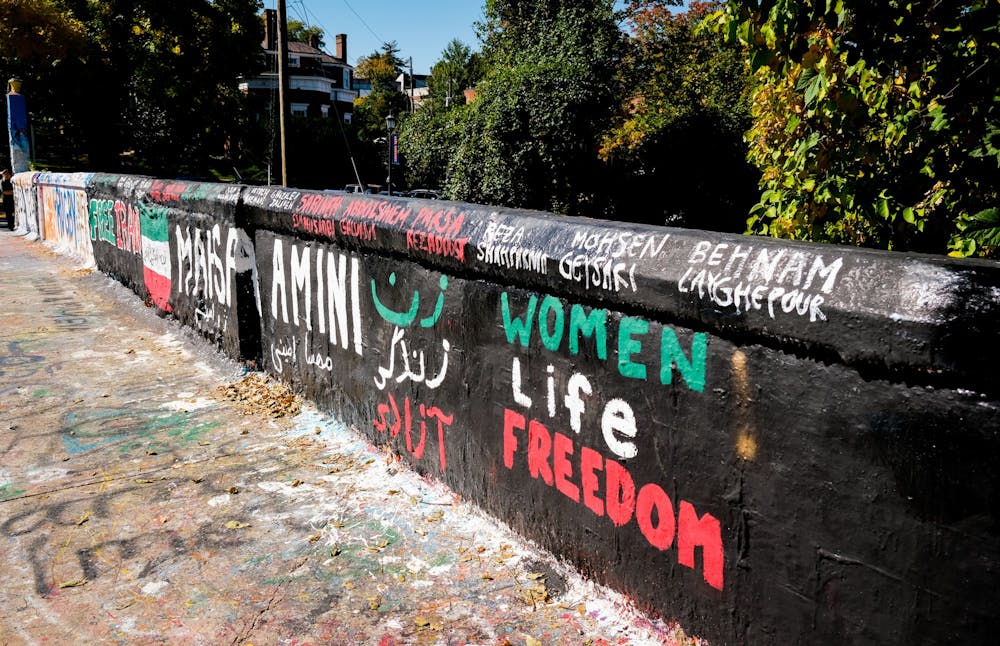Immediately after she stepped off the train in Tehran, Iran Sept. 13, the Morality Police confronted and arrested 22-year-old Mahsa Amini for wearing her hijab too loosely on her head. This authoritative group, responsible for “promoting virtue” in Iran, aggressively beat Amini for attempting to resist the inhumane treatment inflicted upon her. Amini fell into a coma as a result of severe skull fractures and died three days after the arrest. Iranian women were devastated. Mahsa was a sharp, bright woman who attended university and steered clear of politics — an unfortunate necessity for women in Iran. She was these things, and now she is not. She doesn’t get to be — all because she did not wear her hijab in conformance with the Islamic standards of the Iranian government. These heinous actions highlight that the Morality Police is anything but moral.
The public’s criticism has primarily targeted the Iranian government’s response to her death. Doctors withheld Amini’s medical records from her family, police claimed to have “lost access” to camera footage inside the van where she was beaten and authorities delivered twisted statements to the public regarding her death. According to authorities, Amini’s death was a result of a “prior heart condition,” which, according to her family, never existed. To make matters worse, the government has completely cut off Iranian citizens from the outside world by restricting Internet access. The public cannot protest or speak out against the atrocities of the government without facing dire consequences, as protestors are either getting arrested or killed. Iran has robbed its people of the only thing they have left — their voices.
These events have taken a toll on Iranian students everywhere. Police tear-gassed and shot masses of students for protesting these grave injustices at Sharif University in Tehran. All they wanted was to have their voices heard. These brave individuals are our age — they are our people. I could have been among them, had my parents chosen not to immigrate to America years ago. The majority of us Persian students still have family back home who we have no way of contacting. Their Internet connection remains lost, along with any fragment of hope for change.
The University has failed to properly acknowledge or take action in response to these occurrences. I have not received a single email from the University, nor has it made a single social media post acknowledging the unjust repression of Iranian citizens. Most of my non-Iranian peers are not even aware of Amini’s death — it is incredibly frustrating. The only awareness I have witnessed has been from fellow Iranian students. The University’s Persian Cultural Society painted Beta Bridge with words of protest in our flag’s colors of red, white and green. PCS has since worked in collaboration with the Iranian Student Association to organize a peaceful protest that took place Monday. Additionally, it has released a public statement on Instagram and is actively working to help the cause by raising more awareness.
However, Iranian students cannot and should not be solely responsible for bringing this issue to light. The University needs to do more to support Iranian students. For example, the University could use its various media platforms to spread information about Masha’s death and the tragic events that followed. Further, they could actively reach out to the Persian student body to determine what additional support we may need during these challenging times.
Students have a role to play in this as well — we all have a voice. It is common for individuals to lack a sense of responsibility in situations like these, especially when it is not them, or their people, being affected. But if we stand with each other in times of need, the power we hold is unstoppable.
Students at George Washington University in Washington, D.C. demonstrate this power as they protest in solidarity against the Iranian regime. Posters with the words “Women. Life. Freedom.” circulate the nation’s capital as students chant together on the streets. The diversity of people joining the Iranian students as they march is the type of support we need here at the University. Strength in numbers is real, and the more people there are fighting for a cause, the more likely it is for change to be made. Start conversations with those around you, and encourage peers to educate themselves on the crisis in Iran, so they have the knowledge and ability to speak out against it.
I want to be proud of the university I attend. I want change to be made without lives needing to be lost. I want justice for Mahsa Amini.
Leila Mohajer is a Viewpoint Writer who writes about University life for The Cavalier Daily. She can be reached at opinion@cavalierdaily.com.
The opinions expressed in this column are not necessarily those of The Cavalier Daily. Columns represent the views of the authors alone.







